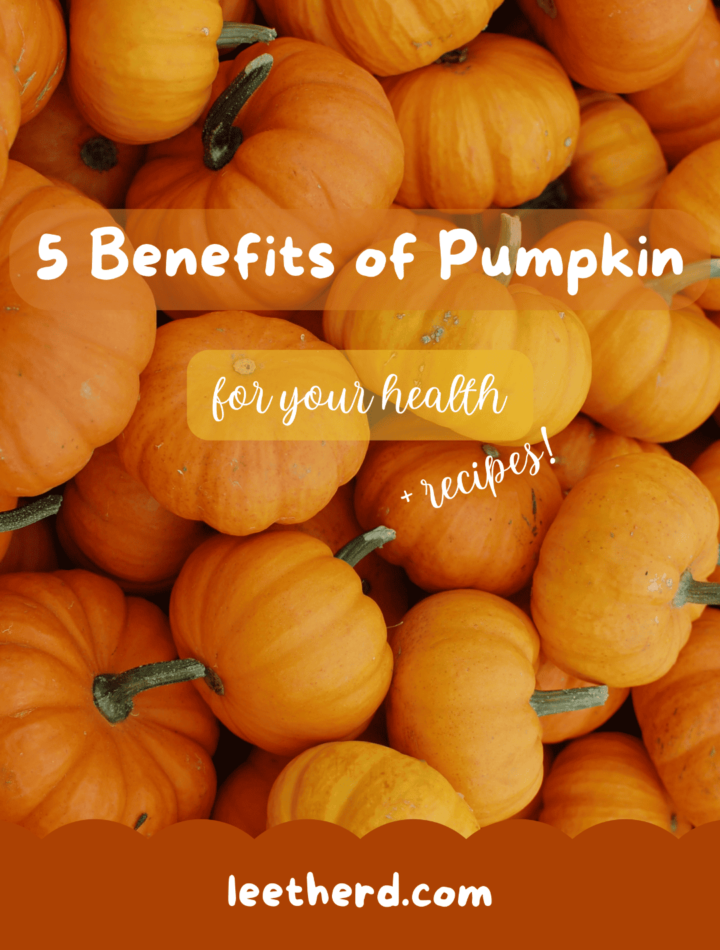As a dietitian, I love pumpkin spice season not only for the flavor itself, but because pumpkin is rich in so many good-for-you vitamins and minerals!
Is Pumpkin Healthy?
Yes absolutely! Pumpkin is technically a fruit. There are many varieties of pumpkin that you can eat. The most tasty ones include sugar pumpkins, pie pumpkins, and Dickinson squash (this is the variety that they use to make Libby’s canned pumpkin!). Sometimes squash varieties are also included in the pumpkin family, as they have similar flavors, textures, and nutritional profiles. These include: kabocha squash, acorn squash, delicata squash, honeynut squash, butternut squash, buttercup squash, and many more.
Why is Pumpkin Good for You?
Although there are probably too many to count, here are 5 benefits of pumpkin for your health:
Pumpkin is rich in vitamin A
Vitamin A supports our immune system, the function of our vital organs, and our vision. Specifically, pumpkin is rich in B carotene, which is a pigment that gives it the vibrant orange color you see. This compound is the precursor to vitamin A and a powerful antioxidant that can reduce your risk of cancer. The richer the orange color, the more B carotene it contains! A half cup of canned pumpkin contains about 100% of your daily needs for Vitamin A.
Pumpkin helps to support your gut health
A half cup of canned pumpkin contains about 3g of fiber. Fiber helps to supports your gut health by feeding the beneficial bacteria in your intestines. When they ferment the fiber, they release compounds like short chain fatty acids, which are important for maintaining the integrity of the gut barrier and regulating inflammation. Additionally, fiber aids in keeping your digestion running smoothly. Don’t throw out the seeds from the pumpkin either! Pumpkin seeds also contain a lot of fiber – about 5g per cup.
Pumpkin helps to lower cholesterol
There are a couple reasons that pumpkin can help to lower cholesterol. The fiber in pumpkin is mostly soluble fiber, which is the type of fiber that can bind to cholesterol in your intestines and prevent absorption. Secondly, pumpkin contains no saturated fat. Saturated fat is the type of fat that correlates to increased cholesterol. We also know that simply increasing your fruits and vegetables can lower cholesterol, and pumpkin is a great one to include in your diet!
Pumpkin helps manage blood sugars
Pumpkin and squash are starchy fruits, however they are much lower in carbs than say a potato. Pumpkin being lower in carbs means that it doesn’t raise blood sugar as much as other starch choices. Another component of pumpkin that helps to manage blood sugars is the fiber content. Fiber takes longer to digest than simple carbs, meaning the sugar takes longer to release into the blood stream. This helps to create a more gradual increase in blood sugars rather than a sudden spike. We know blood sugar control is an important factor for those living with diabetes. For those of you without diabetes, this is still important because steady blood sugars correlate to stable energy levels!
Pumpkin contains potassium.
Pumpkin contains about 6% of your daily value of potassium in each half cup serving . Potassium is an extremely important mineral and electrolyte. It helps to regulate fluid balance and blood pressure. Additionally, it helps your muscles contract. If you sweat a lot from exercise or other physical activity, you may need replenish this important electrolyte. Although there may be more well known sources of potassium (I’m looking at you, banana!) pumpkin can still contribute to your overall daily intake.
Check out these pumpkin recipes on the blog:
Pumpkin Bread with Maple Glaze
Pumpkin Spice Protein Balls – coming soon




